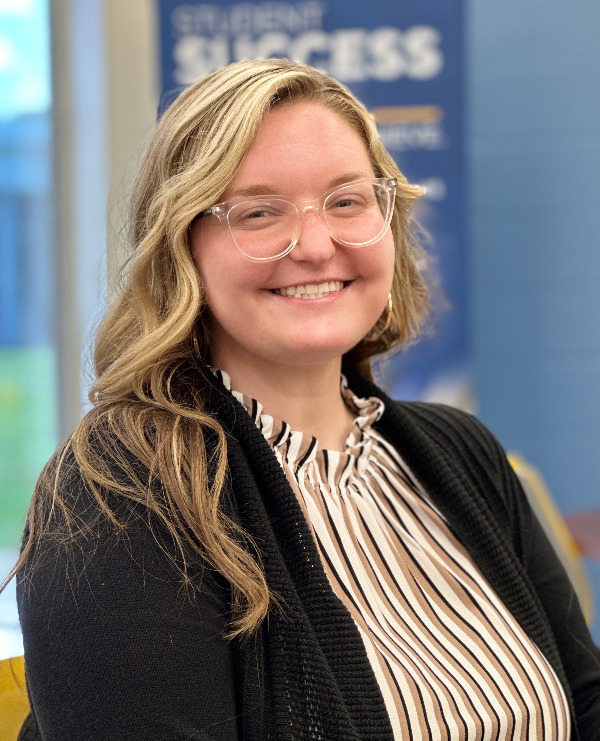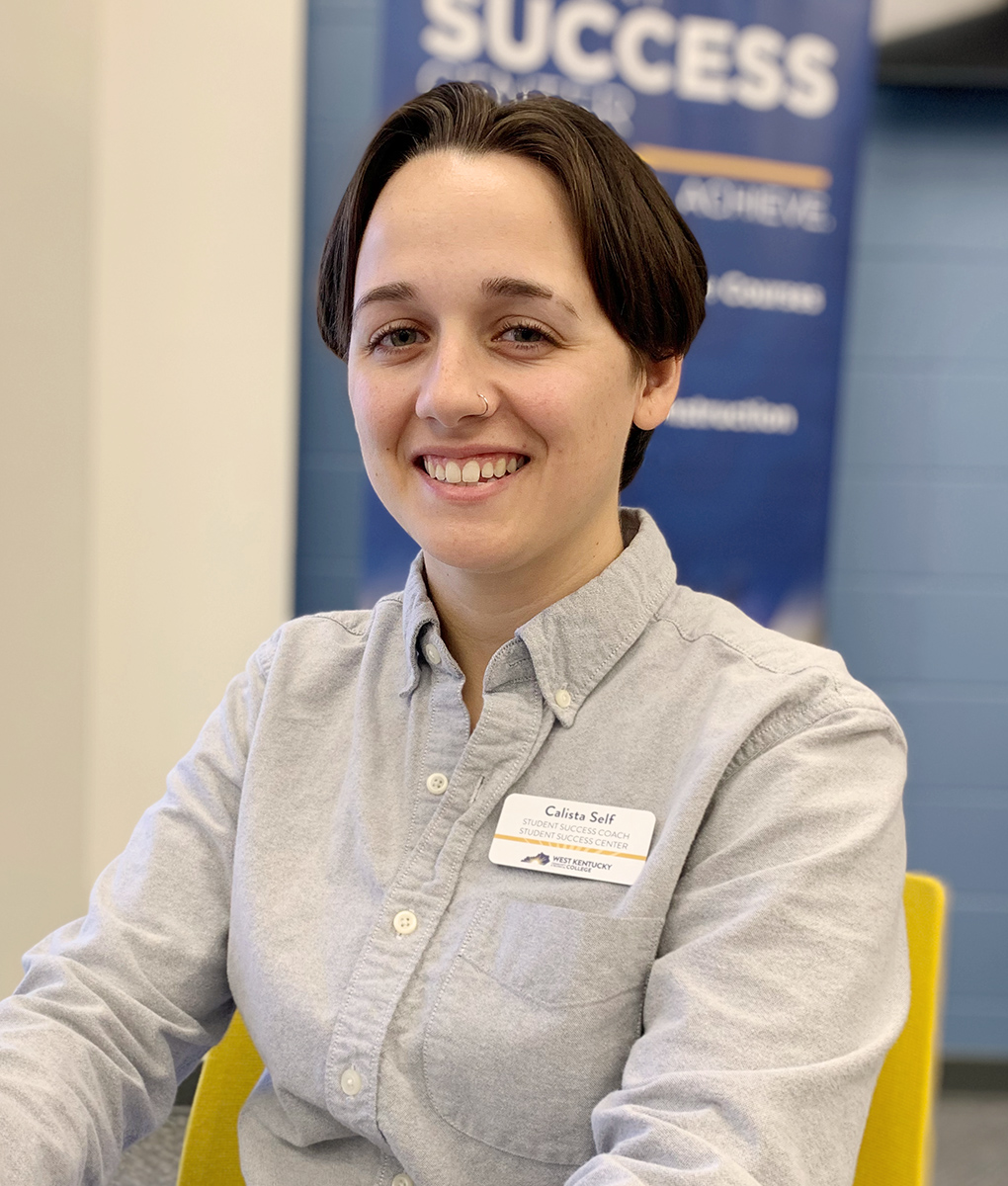
Success Coaching
Success coaching at WKCTC is grounded in empowering our students with the skills, knowledge, and sense of belonging they need to successfully navigate the college culture. Coaches offer various types of support along the students’ pathways to success. While enrolled, students are assisted by their success coaches until they have completed their academic pathways.
Students should reach out to a success coach at the first sign of stress, worry, or concern related to academics or other challenges hindering their academic success. Success coaches help students navigate their academics and track their progress each semester, while providing support to empower and encourage the students in their goals. Coaches are available to offer students individualized support while helping them locate campus and community resources. WKCTC offers a multitude of student support services. The following links provide detailed information for students and campus community members.
Common Student Questions
- Success Coaches can be contacted by phone or email. Coaches typically respond within one business day. See SSC Coaches’ contact information below.
- Starfish is a communication platform used by faculty to send alerts about concerns that may interfere with the progress of their students. These alerts signal success coaches to step in and provide support. Kudos let students know they are on the right track.
- On the WKCTC MyPath page, the Student Self Service tile is located next to your email. This tile provides access to your account, where you can find your financial information.
- The Financial Aid office can be reached at (270) 534-3467 or westkentucky-financialaid@kctcs.edu.
- On the WKCTC MyPath page, the Student Self Service tile is located next to your email, as well as the KCTCS App for Student Self Service.
- The Advising Office can be reached at (270) 534-3349 or wkctcadvising@kctcs.edu.
- Visit the WKCTC MyPath page. Select the Student Self Service tile. Then, click the “Manage Classes” tile.
- Important withdrawal dates, along with other important dates, can be found on the WKCTC academic calendar: Important Withdrawal Dates
- Located on the WKCTC MyPath, the User Account Center gives instructions on how to reset your password with your student ID number or KCTCS ID/Email.
- Check your course syllabus for instructions from your instructor. Contact your instructor for specific advice.
- Check WKCTC MyPath for specific class information or view the Academic Calendar.
- Make sure you use your KCTCS email to contact your instructors. Typically, instructors only reply to KCTCS email accounts.
- Locate the instructor’s office location and hours on the syllabus or online.
- Off-campus adjuncts normally provide a phone number in the syllabus.
- Contact the Dean of that department for advice.
Meet the Success Coaches
Matheson Learning Resource Center, F2
Email: molly.dowell@kctcs.edu
Phone: (270) 534-3396
 Molly attended Murray State University from 2017 to 2023, earning both her Bachelor
of Science and Master of Science in Organizational Communication. Prior to becoming
a Success Coach at WKCTC, Molly gained experience working with college students as
a graduate teaching assistant for introductory public speaking courses. Molly also
spent more than four years as a Community Living Services (CLS) provider to individuals
with intellectual and developmental disabilities. She aims to empower students to
achieve success in their academic and personal journeys through proper planning, perseverance,
and positivity. In her free time, Molly enjoys going to shows/concerts/music festivals,
getting coffee, playing with her beloved cat Frankie, and making memories with her
family and friends.
Molly attended Murray State University from 2017 to 2023, earning both her Bachelor
of Science and Master of Science in Organizational Communication. Prior to becoming
a Success Coach at WKCTC, Molly gained experience working with college students as
a graduate teaching assistant for introductory public speaking courses. Molly also
spent more than four years as a Community Living Services (CLS) provider to individuals
with intellectual and developmental disabilities. She aims to empower students to
achieve success in their academic and personal journeys through proper planning, perseverance,
and positivity. In her free time, Molly enjoys going to shows/concerts/music festivals,
getting coffee, playing with her beloved cat Frankie, and making memories with her
family and friends.
Matheson Learning Resource Center, F1
Email: calista.self@kctcs.edu
Phone: (270) 534-3379
 Calista graduated from Kentucky Wesleyan College in 2021 with a Bachelor of Science
in Communications with an emphasis on Media Studies. Success coaching at WKCTC is
Calista’s first opportunity to put her communication skills to work. She enjoys helping
students plan and achieve their academic goals. Aside from work, Calista enjoys playing
drums, cuddling with her animals, refurbishing furniture, and spending time/traveling
with her partner.
Calista graduated from Kentucky Wesleyan College in 2021 with a Bachelor of Science
in Communications with an emphasis on Media Studies. Success coaching at WKCTC is
Calista’s first opportunity to put her communication skills to work. She enjoys helping
students plan and achieve their academic goals. Aside from work, Calista enjoys playing
drums, cuddling with her animals, refurbishing furniture, and spending time/traveling
with her partner.
Success Coaching Framework
Success coaches foster students' greater sense of belonging and empowerment within the campus learning community. Success coaches support students’ progress toward credential completion by using a case management approach that focuses efforts to engage with students to identify needs, provide support, and connect with campus and community resources that lead to student success.
Effective success coaching incorporates principles that are relevant across various contexts of coaching to ensure benefits to faculty, staff, and students through:
- Communication: Success coaches communicate with students to address academic challenges while navigating the college experience.
- Collaboration: Coaches collaborate with faculty and staff to establish relationships that help identify students’ needs to overcome academic and non-academic barriers.
- Relationships: Success coaches work to foster relationships that support diverse student populations on campus.
- Accountability: Coaches conduct weekly and monthly check-ins with students to monitor academic progress toward credential or degree completion.
- Guidance: Coaches encourage students when facing academic concerns. Coaches create a plan for academic success and identify needed campus or community resources.
By participating in coaching sessions and building relationships with success coaches, students become prepared to Dream, Plan, and Achieve by accomplishing the following expected outcomes:
- Goal Discovery: Students develop knowledge and skills to actively pursue academic and career goals.
- Engagement: Students experience higher levels of engagement to become empowered and gain a sense of belonging.
- Persistence: Students are led to greater persistence when faced with academic or non-academic challenges.
- Graduation/Credential Completion: Students persist semester-to-semester, which promotes greater retention toward graduation or credential completion.
- Career Readiness: Students are prepared to actively seek careers in fields that align with skills and knowledge obtained from their credentials.
